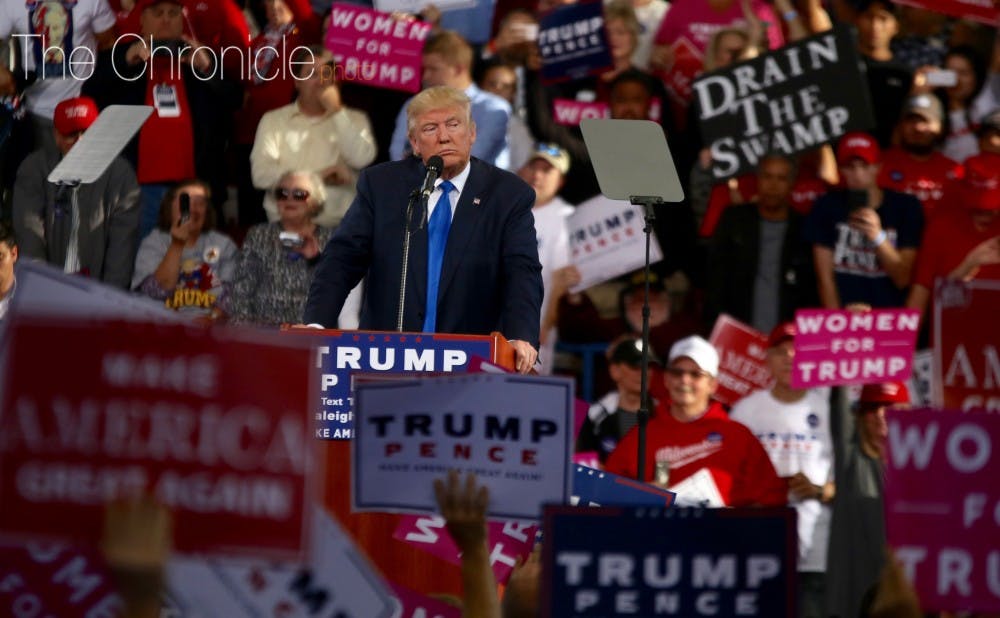President Donald Trump signed an executive order March 21 threatening to withhold federal research grant money from colleges that fail to protect freedom of speech.
But at this time, it is unclear what effect—if any—the order will have on Duke's policies and practices. The order states that grant-making federal agencies will now have to take "take appropriate steps" to ensure that institutions receiving those grants "promote free inquiry."
"For private universities, the executive order essentially says that universities must follow their own policies, and that is something that as an institution we already strive to do at all times," said Michael Schoenfeld, vice president for public affairs and government relations. "Duke has a strong, deep and longstanding commitment to free speech, open discourse, and robust debate on campus. And that will continue regardless of any executive order. Any effort to legislate that at the federal level or even at the state level is, we think, deeply misguided.”
During the signing ceremony, Trump criticized "speech codes," "safe spaces" and "trigger warnings" that he said universities have used to restrict free thought, impose conformity and shut down voices. He specifically targeted university figures who "suppress" students from challenging the “rigid, far-left ideology” he believes is found on college campuses.
"We’re dealing with billions and billions and billions of dollars. Taxpayer dollars should not subsidize anti-First Amendment institutions," Trump said at the ceremony. "Universities that want taxpayer dollars should promote free speech, not silence free speech."
However, the executive order does not specify the conditions for protecting free speech or give guidance on how colleges and universities can comply. Unlike public institutions that are bound to upholding the First Amendment, private institutions set their own rules and policies regarding freedom of speech.
The Association of American Universities, an association of 62 research universities of which Duke is a member, said in a statement that the executive order is “a solution in search of a problem.”
Sophomore Ann Gehan, vice president of Duke Democrats and former columnist for The Chronicle, agreed with the sentiment expressed by the AAU.
Gehan wrote in an email to The Chronicle that she believes Duke students welcome open conversations with students of all political beliefs. Furthermore, she said that the University encourages its students to freely engage with new and differing ideas, pointing to diverse past speakers such as activist Angela Davis and Reince Priebus, former White House chief of staff.
On the other hand, junior Mitchell Siegel—vice chairman of Duke College Republicans and columnist for The Chronicle—said he believes the executive order is not a partisan issue.
He said that the order is necessary to prevent specific campus policies that restrict free speech. Siegel said that defining “hate speech” can be vague and arbitrary—and, when implemented into policy, could be easily weaponized against unpopular, minority views.
“I think the detriment of legislating what speech can be said [on campus] is that it gets very dangerous in terms of what can be censored and can lead to a big slippery slope,” he said.
Gehan, however, noted that there is a need for campus policies that regulate types of speech used to directly attack someone's identity. She said that there is a distinction between unpopular political speech and speech that attacks someone’s basic personal safety and rights.
“The latter has no place on a college campus or anywhere," she said. "I fear that Trump and his supporters are confusing the two and enabling a lot of dangerous ideas to perpetuate."
Nicole Ligon—lecturing fellow and supervising attorney of the First Amendment Clinic at Duke Law School—said that it is easy for minority voices on campus to be shut out. Given that universities tend to be more liberal, she added, conservative opinions tend to be minority voices.
Nevertheless, Ligon pointed out a concerning discrepancy between the executive order and what she characterized as the Trump administration's generally weak history of respecting diverse viewpoints. Ligon emphasized the need to protect all speech, not just what the administration agrees with.
Ligon expressed concern that the executive order oversteps the jurisprudence of the First Amendment. She said that the spirit of the First Amendment is rooted in distrust of the government, so the idea of the government determining protected speech seems inconsistent with the true spirit of the First Amendment.
Beyond support and opposition, there is a question as to whether or not the executive order will produce any changes.
“I don’t really think that there’s going to be an effect at all that comes from this,” Ligon said. “I am not convinced that President Trump really has the authority to pull federal aid from colleges and universities that don't sufficiently guarantee free speech in the manner that he is asking for. And I'm not convinced that without congressional support he can put strings to federal money like that and pull them from research institutions and grants.”
Get The Chronicle straight to your inbox
Signup for our weekly newsletter. Cancel at any time.

Mona Tong is a Trinity senior and director of diversity, equity and inclusion analytics for The Chronicle's 117th volume. She was previously news editor for Volume 116.

